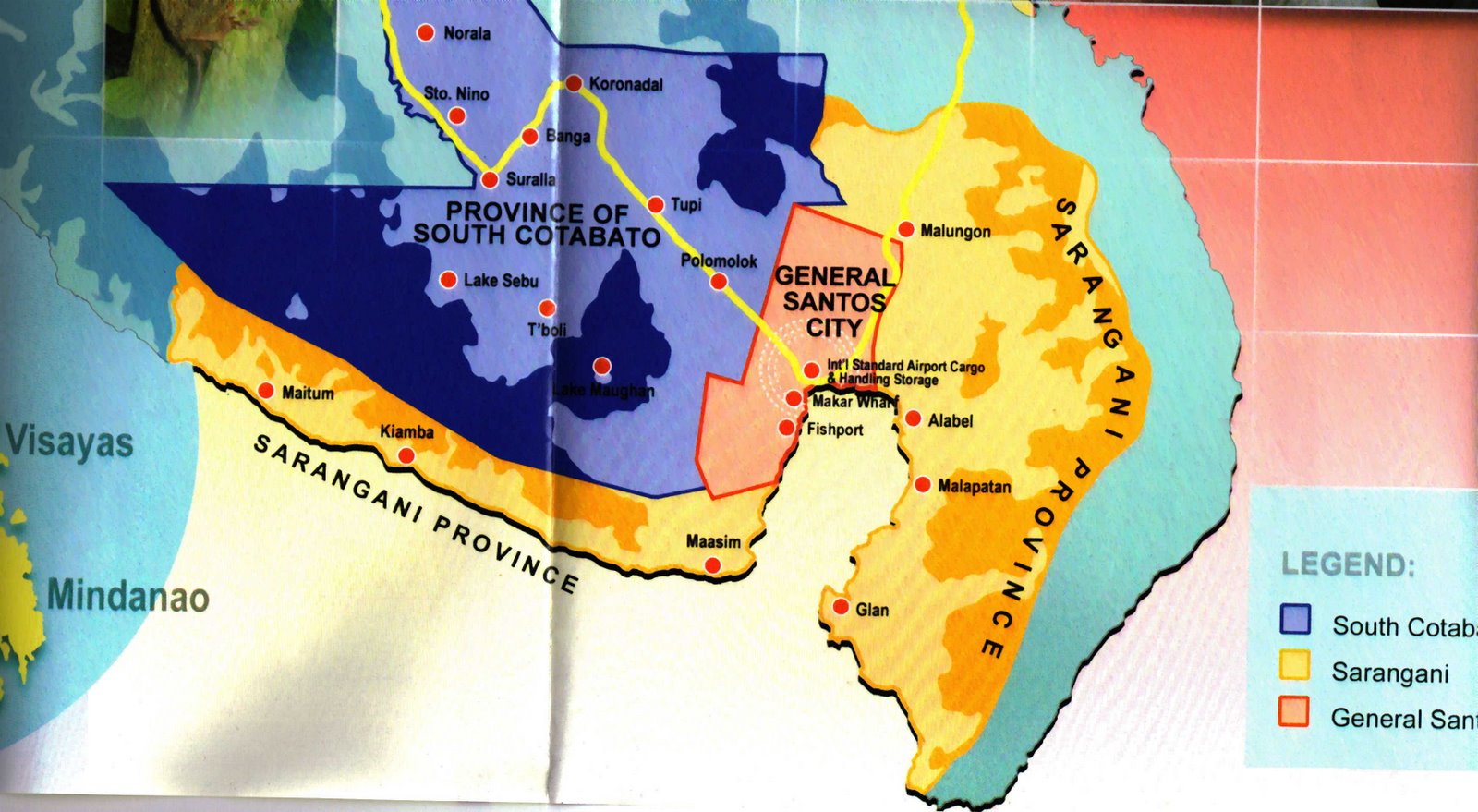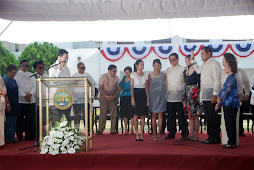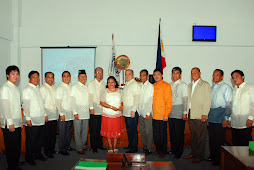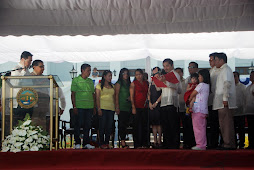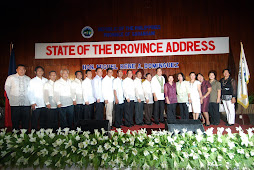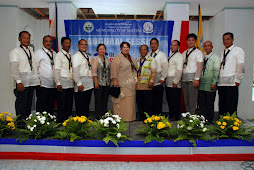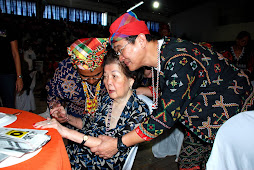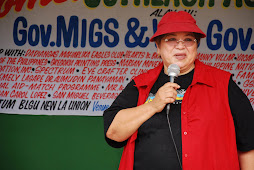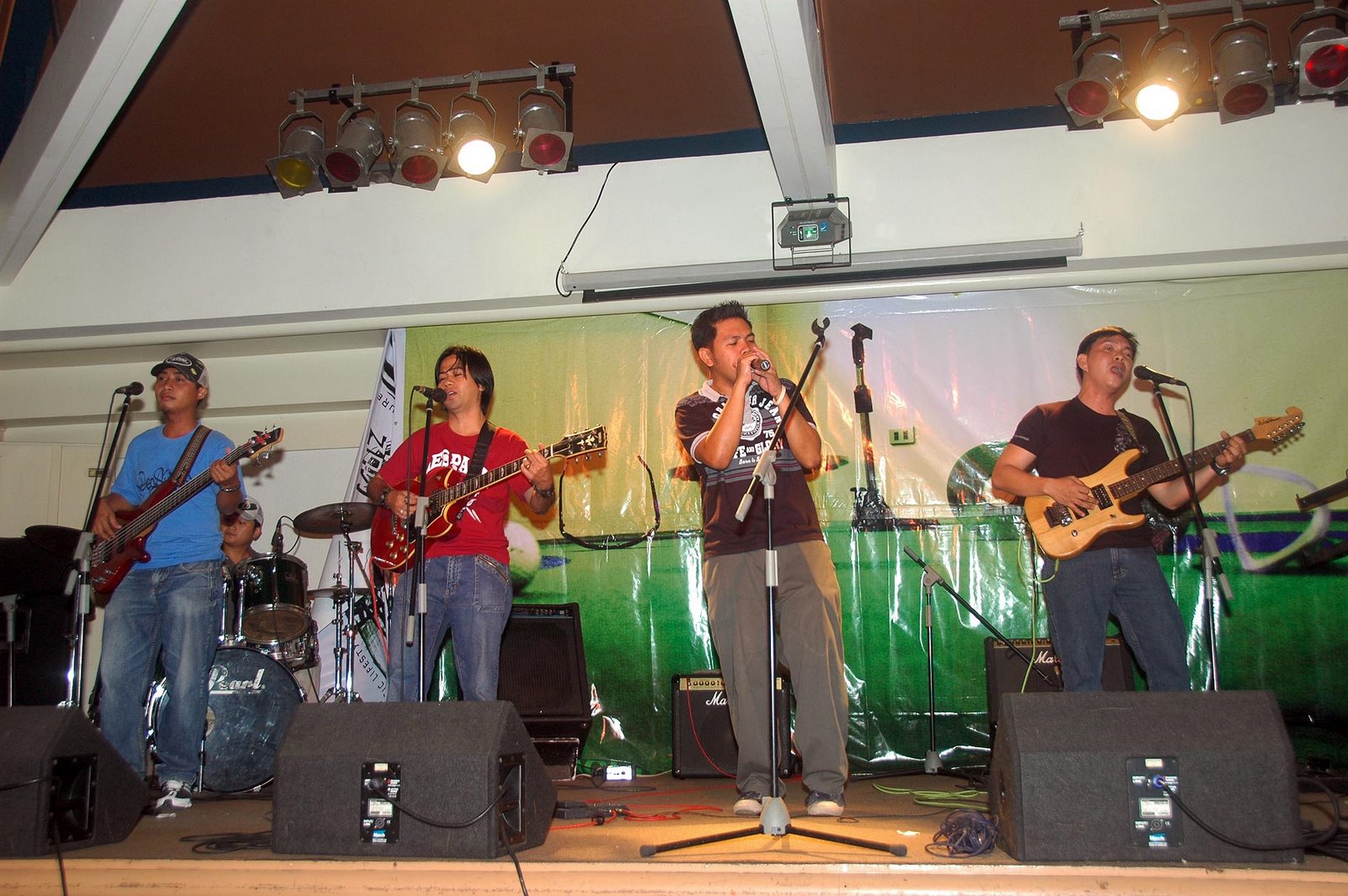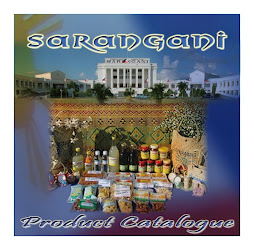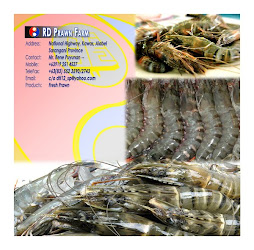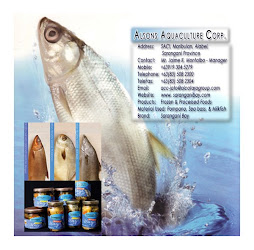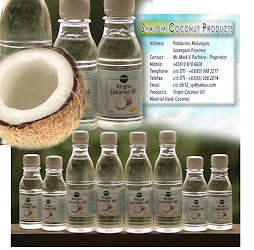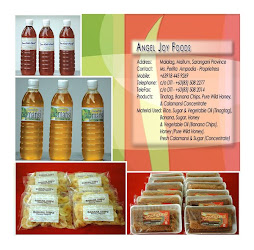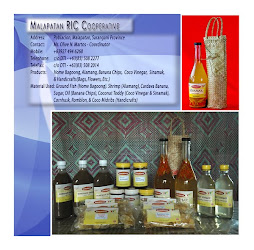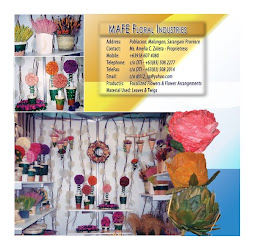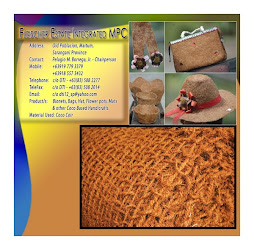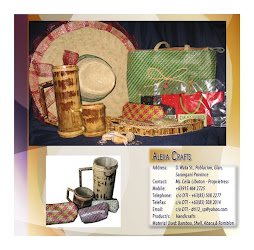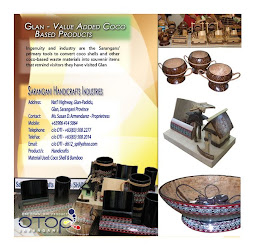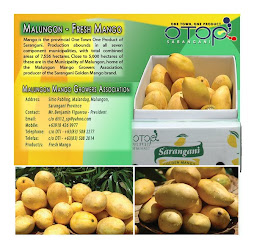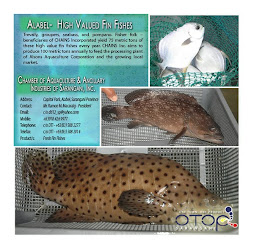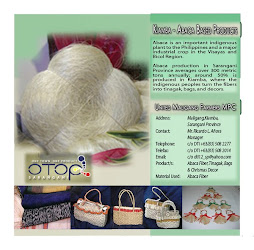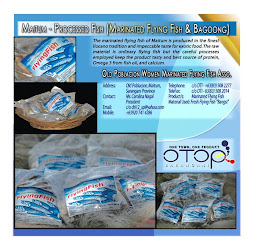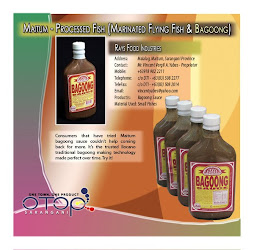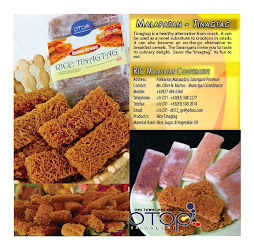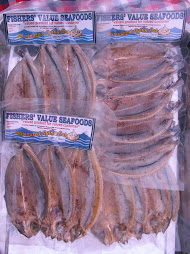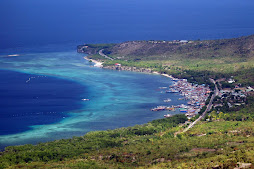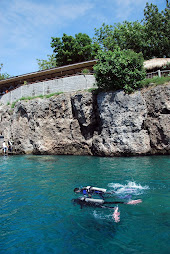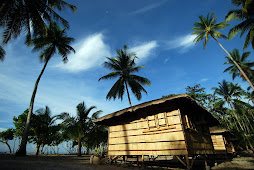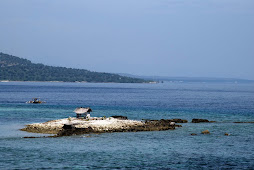 GENERAL SANTOS CITY (November 1, 2008) – Maitum Mayor Elsie Perrett assisted by Karl Vincent Queipo (left), executive director of RD Foundation, and Elipert Labasan (right), project officer of TB LINCMaitum, signs the memorandum of understanding on the implementation of TB prevention program between RD Foundation, Provincial Health Office and local government of Maitum Friday, October 31, at Dolores Tropicana Resort. The TB LINC Project is a new five-year USAID-funded (from October 2006 to September 2011) and DOH-led initiative to sustain the coordination and collaboration of TB control partners from both the public and private sectors. (Photo by Cocoy Sexcion/SARANGANIINFORMATION OFFICE)
GENERAL SANTOS CITY (November 1, 2008) – Maitum Mayor Elsie Perrett assisted by Karl Vincent Queipo (left), executive director of RD Foundation, and Elipert Labasan (right), project officer of TB LINCMaitum, signs the memorandum of understanding on the implementation of TB prevention program between RD Foundation, Provincial Health Office and local government of Maitum Friday, October 31, at Dolores Tropicana Resort. The TB LINC Project is a new five-year USAID-funded (from October 2006 to September 2011) and DOH-led initiative to sustain the coordination and collaboration of TB control partners from both the public and private sectors. (Photo by Cocoy Sexcion/SARANGANIINFORMATION OFFICE)
Friday, October 31, 2008
Understanding vs TB
 GENERAL SANTOS CITY (November 1, 2008) – Maitum Mayor Elsie Perrett assisted by Karl Vincent Queipo (left), executive director of RD Foundation, and Elipert Labasan (right), project officer of TB LINCMaitum, signs the memorandum of understanding on the implementation of TB prevention program between RD Foundation, Provincial Health Office and local government of Maitum Friday, October 31, at Dolores Tropicana Resort. The TB LINC Project is a new five-year USAID-funded (from October 2006 to September 2011) and DOH-led initiative to sustain the coordination and collaboration of TB control partners from both the public and private sectors. (Photo by Cocoy Sexcion/SARANGANIINFORMATION OFFICE)
GENERAL SANTOS CITY (November 1, 2008) – Maitum Mayor Elsie Perrett assisted by Karl Vincent Queipo (left), executive director of RD Foundation, and Elipert Labasan (right), project officer of TB LINCMaitum, signs the memorandum of understanding on the implementation of TB prevention program between RD Foundation, Provincial Health Office and local government of Maitum Friday, October 31, at Dolores Tropicana Resort. The TB LINC Project is a new five-year USAID-funded (from October 2006 to September 2011) and DOH-led initiative to sustain the coordination and collaboration of TB control partners from both the public and private sectors. (Photo by Cocoy Sexcion/SARANGANIINFORMATION OFFICE)
TB prevention program
 GENERAL SANTOS CITY (November 1, 2008) – Sarangani health officer Dr.Antonio Yasaña answers participants in an open forum during the TB prevention project orientation of RD Foundation, Philippine Businessfor Social Progress, USAID and TB LINC (Linking Initiatives and Network in Controlling Tuberculosis) Friday, October 31, at Dolores Tropicana Resort. The program is implemented through the Department of Health's National Tuberculosis Control Program and with the support of local governments. (Photo by Cocoy Sexcion/SARANGANI INFORMATIONOFFICE)
GENERAL SANTOS CITY (November 1, 2008) – Sarangani health officer Dr.Antonio Yasaña answers participants in an open forum during the TB prevention project orientation of RD Foundation, Philippine Businessfor Social Progress, USAID and TB LINC (Linking Initiatives and Network in Controlling Tuberculosis) Friday, October 31, at Dolores Tropicana Resort. The program is implemented through the Department of Health's National Tuberculosis Control Program and with the support of local governments. (Photo by Cocoy Sexcion/SARANGANI INFORMATIONOFFICE)
Thursday, October 30, 2008
Turn-over
 ALABEL, Sarangani (October 30, 2008) – Gov. Migs Dominguez with top provincial children's rights advocates Dr. Antonio Yasaña (partly hidden), provincial health officer, and Raquel Panal (extreme right), assistant provincial social welfare officer, turn over to municipal social welfare officers development materials on welfare for children and early childhood care and development Thursday, October 30. (Photo by Cocoy Sexcion/SARANGANI INFORMATION OFFICE)
ALABEL, Sarangani (October 30, 2008) – Gov. Migs Dominguez with top provincial children's rights advocates Dr. Antonio Yasaña (partly hidden), provincial health officer, and Raquel Panal (extreme right), assistant provincial social welfare officer, turn over to municipal social welfare officers development materials on welfare for children and early childhood care and development Thursday, October 30. (Photo by Cocoy Sexcion/SARANGANI INFORMATION OFFICE)
Provincial Children's Month Culmination
 ALABEL, Sarangani (October 30, 2008) - Jumatte Don Fermasis and Mia Kryzel Ann Rendon perform a ballroom dance number during the Provincial Children's Month Culmination and State of the Children Report of Gov. Migs Dominguez Thursday, October 30, at the Capitol gymnasium. This year's theme is "BRIGHT CHILD: Sa Tamang Pag-aaruga, Kinabukasan ay Maginhawa". (Photo by Cocoy Sexcion/SARANGANI INFORMATION OFFICE)
ALABEL, Sarangani (October 30, 2008) - Jumatte Don Fermasis and Mia Kryzel Ann Rendon perform a ballroom dance number during the Provincial Children's Month Culmination and State of the Children Report of Gov. Migs Dominguez Thursday, October 30, at the Capitol gymnasium. This year's theme is "BRIGHT CHILD: Sa Tamang Pag-aaruga, Kinabukasan ay Maginhawa". (Photo by Cocoy Sexcion/SARANGANI INFORMATION OFFICE)
Pre-schoolers
Development materials for children
 ALABEL, Sarangani (October 30, 2008) – Gov. Migs Dominguez assisted by Dr. Antonio Yasaña, provincial health officer, signs documents that officially turns over development materials on welfare for children and early childhood care and development to 13 health care and 20 day care centers throughout the province during the Provincial Children's Month Culmination and State of the Children Report of Gov. Dominguez Thursday, October 30, at the Capitol gymnasium. This year's theme is "BRIGHT CHILD: Sa Tamang Pag-aaruga, Kinabukasan ay Maginhawa". (Photo by Cocoy Sexcion/SARANGANI INFORMATION OFFICE)
ALABEL, Sarangani (October 30, 2008) – Gov. Migs Dominguez assisted by Dr. Antonio Yasaña, provincial health officer, signs documents that officially turns over development materials on welfare for children and early childhood care and development to 13 health care and 20 day care centers throughout the province during the Provincial Children's Month Culmination and State of the Children Report of Gov. Dominguez Thursday, October 30, at the Capitol gymnasium. This year's theme is "BRIGHT CHILD: Sa Tamang Pag-aaruga, Kinabukasan ay Maginhawa". (Photo by Cocoy Sexcion/SARANGANI INFORMATION OFFICE)
Children report
 ALABEL, Sarangani (October 30, 2008) - "It takes a village to raise a child" are some of the meaningful words by Gov. Migs Dominguez as he once again urged parents to spend time with their children instead of watching TV series. The governor delivered his annual State of the Children Report Thursday, October 30. (Photo by Cocoy Sexcion/SARANGANI INFORMATION OFFICE)
ALABEL, Sarangani (October 30, 2008) - "It takes a village to raise a child" are some of the meaningful words by Gov. Migs Dominguez as he once again urged parents to spend time with their children instead of watching TV series. The governor delivered his annual State of the Children Report Thursday, October 30. (Photo by Cocoy Sexcion/SARANGANI INFORMATION OFFICE)
Wednesday, October 29, 2008
Maitum is best child-friendly town
 KORONADAL CITY (October 29, 2008) – Maitum Mayor Elsie Lucille Perrett (center) receives the regional award as Best Child-Friendly Municipality under the 1st-3rd Class Municipality in Region XII from Social Welfare regional director Sorahayda Taha in Koronadal City Wednesday, October 29. With the mayor is Vice Mayor Tito Balazon, Kagawad Jess Bascuna, and technical working group members of the municipality. Maitum has been short-listed for the national validation of the Presidential Award for Child-Friendly Municipalities and Cities under the 1st-3rd class category. This means that Maitum automatically qualifies as one of the contenders for this prestigious award. (Photo by Beth R. Palma Gil/MAITUM INFORMATION OFFICE)
KORONADAL CITY (October 29, 2008) – Maitum Mayor Elsie Lucille Perrett (center) receives the regional award as Best Child-Friendly Municipality under the 1st-3rd Class Municipality in Region XII from Social Welfare regional director Sorahayda Taha in Koronadal City Wednesday, October 29. With the mayor is Vice Mayor Tito Balazon, Kagawad Jess Bascuna, and technical working group members of the municipality. Maitum has been short-listed for the national validation of the Presidential Award for Child-Friendly Municipalities and Cities under the 1st-3rd class category. This means that Maitum automatically qualifies as one of the contenders for this prestigious award. (Photo by Beth R. Palma Gil/MAITUM INFORMATION OFFICE)
Movement for cityhood
 ALABEL, Sarangani (October 29, 2008) – Mayor Corazon Grafilo (left) of Alabel together with other officials meet with Vice Governor Steve Chiongbian Solon to present the proposal of Alabel's application for cityhood based on their annual income, land area and population. (Photo by Bon-Bon Quiño/SARANGANI INFORMATION OFFICE)
ALABEL, Sarangani (October 29, 2008) – Mayor Corazon Grafilo (left) of Alabel together with other officials meet with Vice Governor Steve Chiongbian Solon to present the proposal of Alabel's application for cityhood based on their annual income, land area and population. (Photo by Bon-Bon Quiño/SARANGANI INFORMATION OFFICE)
Consultation
 ALABEL, Sarangani (October 29, 2008) - Vice Governor Steve Chiongbian Solon listens to Boni Lawa (right), provincial tribal council chair, during the celebration of Indigenous People's Month Wednesday, October 29, in line with the National Indigenous People's Day at the Capitol gym. (Photo by Cocoy Sexcion/SARANGANI INFORMATION OFFICE)
ALABEL, Sarangani (October 29, 2008) - Vice Governor Steve Chiongbian Solon listens to Boni Lawa (right), provincial tribal council chair, during the celebration of Indigenous People's Month Wednesday, October 29, in line with the National Indigenous People's Day at the Capitol gym. (Photo by Cocoy Sexcion/SARANGANI INFORMATION OFFICE)
Chieftain
 ALABEL, Sarangani (October 29, 2008) – Blaan chieftain Bonifacio Lawa, provincial tribal council chair, expresses his thanks to the provincial government for its unwavering support to the lumads during the Indigenous People's Thanksgiving Day Wednesday, October 29, at the Capitol gym. (Photo by Cocoy Sexcion/SARANGANI INFORMATION OFFICE)
ALABEL, Sarangani (October 29, 2008) – Blaan chieftain Bonifacio Lawa, provincial tribal council chair, expresses his thanks to the provincial government for its unwavering support to the lumads during the Indigenous People's Thanksgiving Day Wednesday, October 29, at the Capitol gym. (Photo by Cocoy Sexcion/SARANGANI INFORMATION OFFICE)
Blaan tribal councilor
 ALABEL, Sarangani (October 29, 2008) - Benigno Balunto, Blaan tribal councilor of barangay Amsipit in Maasim, renders a tribal song during the Indigenous People's Thanksgiving Day Wednesday, October 29, at the Capitol gym. The celebration theme is "Itaguyod, Ipagtanggol at Ipaglaban tungo sa Kapayapaan at Kaunlaran ng Sambayanan. (Photo by Cocoy Sexcion/SARANGANI INFORMATION OFFICE)
ALABEL, Sarangani (October 29, 2008) - Benigno Balunto, Blaan tribal councilor of barangay Amsipit in Maasim, renders a tribal song during the Indigenous People's Thanksgiving Day Wednesday, October 29, at the Capitol gym. The celebration theme is "Itaguyod, Ipagtanggol at Ipaglaban tungo sa Kapayapaan at Kaunlaran ng Sambayanan. (Photo by Cocoy Sexcion/SARANGANI INFORMATION OFFICE)
Training camp
Quality coffee beans
 TAGUM CITY (October 29, 2008) – Barangay Captain Caris Salimama (2nd from right) of Datal Anggas in Alabel and members of the 13-man rebel returnees from the same village inspect quality coffee beans during their Coffee Technology Production Training at Nestle Experimental and Demo Farm at Magdum, Tagum City, on October 20-24. (Photo by Jon Sinfuego/SARANGANI INFORMATION OFFICE)
TAGUM CITY (October 29, 2008) – Barangay Captain Caris Salimama (2nd from right) of Datal Anggas in Alabel and members of the 13-man rebel returnees from the same village inspect quality coffee beans during their Coffee Technology Production Training at Nestle Experimental and Demo Farm at Magdum, Tagum City, on October 20-24. (Photo by Jon Sinfuego/SARANGANI INFORMATION OFFICE)
From arms to coffee farms
 ALABEL, Sarangani (October 29, 2008) – Thirteen rebel returnees from barangay Datal Anggas pay a courtesy call to Vice Governor Steve Chiongbian Solon after completing their five-day Coffee Technology Production Training at Nestle Experimental and Demo Farm in Magdum, Tagum City. These former rebels are coffee farmers in their village and given livelihood training in coffee production for improved and good quality coffee. (Photo by Bon-Bon Quiño/SARANGANI INFORMATION OFFICE)
ALABEL, Sarangani (October 29, 2008) – Thirteen rebel returnees from barangay Datal Anggas pay a courtesy call to Vice Governor Steve Chiongbian Solon after completing their five-day Coffee Technology Production Training at Nestle Experimental and Demo Farm in Magdum, Tagum City. These former rebels are coffee farmers in their village and given livelihood training in coffee production for improved and good quality coffee. (Photo by Bon-Bon Quiño/SARANGANI INFORMATION OFFICE)
Tuesday, October 28, 2008
Teachers' training
 MALUNGON, Sarangani (October 28, 2008) – Principal Vilma Eugenio (left) explains UnionBank's workbook "As A Filipino" to Grade II teachers of Malungon South District's 27 elementary and primary schools attending the Teachers' Training Tuesday, October 28, at Malungon Central Elementary School. UnionBank's Learning System aims to teach developmental reading skills to primary schoolers through story-telling and poetry condensed from the context of the Philippine Constitution to develop the values of love of country and nation-building aside from the skills. (Photo by Bobby Saya-ang/SARANGANI INFORMATION OFFICE)
MALUNGON, Sarangani (October 28, 2008) – Principal Vilma Eugenio (left) explains UnionBank's workbook "As A Filipino" to Grade II teachers of Malungon South District's 27 elementary and primary schools attending the Teachers' Training Tuesday, October 28, at Malungon Central Elementary School. UnionBank's Learning System aims to teach developmental reading skills to primary schoolers through story-telling and poetry condensed from the context of the Philippine Constitution to develop the values of love of country and nation-building aside from the skills. (Photo by Bobby Saya-ang/SARANGANI INFORMATION OFFICE)Teachers' QUEST
 MALUNGON, Sarangani (October 28, 2008) – Alcantara Foundation (AF) executive director Cecile Dominguez gives the rationale and overview of the Quality Education for Sarangani Today (QUEST) Teachers' Training Tuesday, October 28, at Malungon Central Elementary School for 27 primary and elementary Grade II teachers in Malungon South District. The teachers will use Union Bank's "As A Filipino" Learning System. The town launched Synergeia's QUEST Program Tuesday last week with AF and the local government. (Photo by Bobby Saya-ang/SARANGANI INFORMATION OFFICE)
MALUNGON, Sarangani (October 28, 2008) – Alcantara Foundation (AF) executive director Cecile Dominguez gives the rationale and overview of the Quality Education for Sarangani Today (QUEST) Teachers' Training Tuesday, October 28, at Malungon Central Elementary School for 27 primary and elementary Grade II teachers in Malungon South District. The teachers will use Union Bank's "As A Filipino" Learning System. The town launched Synergeia's QUEST Program Tuesday last week with AF and the local government. (Photo by Bobby Saya-ang/SARANGANI INFORMATION OFFICE)Tamadang farm road
 KIAMBA, Sarangani (October 28, 2008) – Construction of the two-kilometer Tamadang–Falel farm-to-market-road (FMR) and the seven-kilometer Falel–Datal Bong FMR officially starts Monday, October 27. The project is a joint effort by the local government and the United States Government through the Visiting Forces Agreement (VFA). Onboard the bulldozer are (from right) Mayor Rom Falgui, former DENR undersecretary Francisco Bravo and engineer James Webster who represents the United States Government. VFA has also facilitated the ongoing construction of a two-classroom school building in Falel Community School. (Photo by Ruel D. Ampatin/KIAMBA NEWS & INFO CENTER)
KIAMBA, Sarangani (October 28, 2008) – Construction of the two-kilometer Tamadang–Falel farm-to-market-road (FMR) and the seven-kilometer Falel–Datal Bong FMR officially starts Monday, October 27. The project is a joint effort by the local government and the United States Government through the Visiting Forces Agreement (VFA). Onboard the bulldozer are (from right) Mayor Rom Falgui, former DENR undersecretary Francisco Bravo and engineer James Webster who represents the United States Government. VFA has also facilitated the ongoing construction of a two-classroom school building in Falel Community School. (Photo by Ruel D. Ampatin/KIAMBA NEWS & INFO CENTER)
Message of acknowledgment
 KIAMBA, Sarangani (October 28, 2008) – Mayor Rom Falgui acknowledges the cooperation of the United States Government through the Visiting Forces Agreement represented by engineer James Webster (right), during the groundbreaking ceremony of two-kilometer Tamadang–Falel farm-to-market-road (FMR) and seven-kilometer Falel–Datal Bong FMR Monday October 27. (Photo by KIAMBA NEWS & INFO CENTER)
KIAMBA, Sarangani (October 28, 2008) – Mayor Rom Falgui acknowledges the cooperation of the United States Government through the Visiting Forces Agreement represented by engineer James Webster (right), during the groundbreaking ceremony of two-kilometer Tamadang–Falel farm-to-market-road (FMR) and seven-kilometer Falel–Datal Bong FMR Monday October 27. (Photo by KIAMBA NEWS & INFO CENTER)
Kiamba No. 1
 KIAMBA, Sarangani (October 28, 2008) – Villagers of barangay Tamadang join Mayor Rom Falgui (extreme right), barangay chair and tribal chieftain Rudy Tagum (middle) and former DENR undersecretary Francisco Bravo (3rd from right) in yelling "Kiamba Number One" during the groundbreaking of two-kilometer Tamadang–Falel farm-to-market-road (FMR) and seven-kilometer Falel–Datal Bong FMR Monday, October 27. The project is a joint effort by the local government and the United States Government through the Visiting Forces Agreement. Just recently, the T'boli community received three portable abaca stripping machines from the local government in partnership with the Philippine Environmental Governance (EcoGov) project. Sitio Falel is a two-kilometer uphill trek from Tamadang proper, with Tboli villagers who depend on abaca production as their source of living. (Photo by Ray Daniel/KIAMBA NEWS & INFO CENTER)
KIAMBA, Sarangani (October 28, 2008) – Villagers of barangay Tamadang join Mayor Rom Falgui (extreme right), barangay chair and tribal chieftain Rudy Tagum (middle) and former DENR undersecretary Francisco Bravo (3rd from right) in yelling "Kiamba Number One" during the groundbreaking of two-kilometer Tamadang–Falel farm-to-market-road (FMR) and seven-kilometer Falel–Datal Bong FMR Monday, October 27. The project is a joint effort by the local government and the United States Government through the Visiting Forces Agreement. Just recently, the T'boli community received three portable abaca stripping machines from the local government in partnership with the Philippine Environmental Governance (EcoGov) project. Sitio Falel is a two-kilometer uphill trek from Tamadang proper, with Tboli villagers who depend on abaca production as their source of living. (Photo by Ray Daniel/KIAMBA NEWS & INFO CENTER)
Monday, October 27, 2008
Youngest weaver
 MALUNGON, Sarangani (October 27, 2008) - Kristine Joy Malagante expresses her gratitude to her teacher during the Blaan Tabih Cloth Weaving Graduation Ceremony Monday, October 27, at the Living Museum in Lamlifew. Kristine Joy is the youngest weaver in this Blaan community. (Photo by Cocoy Sexcion/SARANGANI INFORMATION OFFICE)
MALUNGON, Sarangani (October 27, 2008) - Kristine Joy Malagante expresses her gratitude to her teacher during the Blaan Tabih Cloth Weaving Graduation Ceremony Monday, October 27, at the Living Museum in Lamlifew. Kristine Joy is the youngest weaver in this Blaan community. (Photo by Cocoy Sexcion/SARANGANI INFORMATION OFFICE)
IPDP Manager
 MALUNGON, Sarangani (October 27, 2008) - Beth Farnazo, Indigenous People's Development Program manager, assures the Blaan folk of the province's unending support in preserving their culture at the Blaan Tabih Cloth-Weaving Graduation Ceremony Monday, October 27, at the Living Museum in Lamlifew, a Blaan village. (Photo by Cocoy Sexcion/SARANGANI INFORMATION OFFICE)
MALUNGON, Sarangani (October 27, 2008) - Beth Farnazo, Indigenous People's Development Program manager, assures the Blaan folk of the province's unending support in preserving their culture at the Blaan Tabih Cloth-Weaving Graduation Ceremony Monday, October 27, at the Living Museum in Lamlifew, a Blaan village. (Photo by Cocoy Sexcion/SARANGANI INFORMATION OFFICE)
Graduation picture
 MALUNGON, Sarangani (October 27, 2008) – The class of the Blaan Tabih Weaving pose with their families during their Graduation Ceremony Monday, October 27, at the Living Museum in Lamlifew, a Blaan village. Sarangani has three organized Schools of Living Traditions which the province's Indigenous People's Development Program has been supporting. (Photo by Cocoy Sexcion/SARANGANI INFORMATION OFFICE)
MALUNGON, Sarangani (October 27, 2008) – The class of the Blaan Tabih Weaving pose with their families during their Graduation Ceremony Monday, October 27, at the Living Museum in Lamlifew, a Blaan village. Sarangani has three organized Schools of Living Traditions which the province's Indigenous People's Development Program has been supporting. (Photo by Cocoy Sexcion/SARANGANI INFORMATION OFFICE)
Playtime
Kiamba Children's Congress
 KIAMBA, Sarangani (October 27, 2008) – Mayor Rom Falgui gives his message during the Children's Congress as the town marks the Children's Month celebration Monday, October 27, in which he urged the community to be vital part in sustaining a child-friendly environment through unity, cooperation, awareness and vigilance. "Let us make it our advocacy and commitment, to uphold children's rights in our municipality especially during this peace and security crisis," the mayor said. (Photo by Ruel D. Ampatin/KIAMBA NEWS & INFO CENTER)
KIAMBA, Sarangani (October 27, 2008) – Mayor Rom Falgui gives his message during the Children's Congress as the town marks the Children's Month celebration Monday, October 27, in which he urged the community to be vital part in sustaining a child-friendly environment through unity, cooperation, awareness and vigilance. "Let us make it our advocacy and commitment, to uphold children's rights in our municipality especially during this peace and security crisis," the mayor said. (Photo by Ruel D. Ampatin/KIAMBA NEWS & INFO CENTER)
Saturday, October 25, 2008
Artifacts discovery might lead to lost tribe
 By Manny Mogato Manny Mogato – Thu Oct 23, 8:25 pm ET
By Manny Mogato Manny Mogato – Thu Oct 23, 8:25 pm ETMANILA (Reuters) – When Philippine police confiscated 22 bags of broken pottery from antiquity smugglers near an area where Muslim rebels operated, little did they know that they may have uncovered the remnants of a long-lost tribe.
Now, experts at the National Museum in the capital Manila are studying the burial urns from a tribe that lived in the Philippines over 2,000 years ago, in what could be a major archaeological discovery.
"The pottery has human faces that show emotions," Eusebio Dizon, head of the archaeological unit at the National Museum, told Reuters.
Dizon said that pictures of people on the shards might mean the tribe that used the vessels had different origins from the known indigenous tribes in the Philippines.
"The Manobos, Tirurays and B'laans tribes that have survived over time do not bury their dead in painted anthropomorphic (human form) jars. So, we have no idea what kind of people are behind these unique burial jars," Dizon said.
A U.S.-trained archaeologist, Dizon spent several years in the 1990s excavating in a cave in Sarangani province on Mindanao after he was tipped off by treasure hunters about rare anthropomorphic, or human form, pottery in the area. Carbon dating tests showed the jars to be from about 5 BC.
He said the latest pottery find could be much older because of the cruder method used in the pottery as well as the human forms on the jars. But, further studies are needed to establish the real origins of the latest finds, he added.
"We have no idea where these artifacts come from because the people who were trying to smuggle them out from the area could not tell us where exactly they found those materials. But, I am sure the materials are not fake."
Rene Miguel Dominguez, governor of Sarangani province, said they were told the latest pottery was found near Palembang town, a coastal area in the adjacent Sultan Kudarat province where Muslim rebels are very active.
RARE AND UNIQUE
Archaeologists have uncovered late stone-age weapons, pottery and other artifacts in digs in the region.
"(But) Anthropomorphic pottery is seldom seen in this part of the world," Dizon said.
Angel Bautista, head of the National Museum's cultural property division, said the government wanted the new discovery to be declared a "national treasure," but further investigations were needed to establish provenance.
Dizon said it was important for archaeology experts to inspect the places where the pottery was found and examine the "primary data" that might reveal valuable information about what could be one of the earliest sites of human habitation in the country.
However, the museum lacked the resources to embark on a major exploration in an area where there has been sporadic fighting between troops and the country's largest Islamic rebel group.
Dominguez said some areas where the pottery was suspected to have been found were controlled by Muslim rebels that demand huge sums of money to allow further archaeological exploration work.
"These pottery pieces are part of our pre-historic history and the government must do everything to protect the site where these materials were found," he said.
Apart from rebels and lawless groups active in the areas, archaeologists may have to race against antiquity dealers and treasure hunters as the artifacts could fetch millions of pesos on the black market.
"We could learn more about our past from this pottery, but first we need to preserve and protect the areas from where these materials have been found," he added.
(Editing by Megan Goldin)
Source: http://news.yahoo.com/s/nm/20081024/sc_nm/us_philippines_archaeology_2
Friday, October 24, 2008
Children's Congress
Barefoot calisthenics
Ready for delivery
Entrepreneur mothers
Crispy and sweet
Air-dried banana chips
 MAASIM, Sarangani (October 24, 2008) – Fresh plaintain or cardaba banana are classified for the right size, checked for disease, peeled, sliced, then air-dried inside the building. Neighbors supply the banana and processed by Debemar's into sweetened banana chips. Cardaba is Maasim's One Town, One Product (OTOP). (Photo by Cocoy Sexcion/SARANGANI INFORMATION OFFICE)
MAASIM, Sarangani (October 24, 2008) – Fresh plaintain or cardaba banana are classified for the right size, checked for disease, peeled, sliced, then air-dried inside the building. Neighbors supply the banana and processed by Debemar's into sweetened banana chips. Cardaba is Maasim's One Town, One Product (OTOP). (Photo by Cocoy Sexcion/SARANGANI INFORMATION OFFICE)
Mother's sweet business
By Russtum G. Pelima
MAASIM, Sarangani (October 24, 2008) – Up the limestone hills of this town is a small community where mothers find from neighbors a small-time business.
Maybe worth more than that that the ladies, once quitted the business, had really never stopped them from pushing harder the hobby of cooking that brings a little savings for the family.
A village built by Gawad Kalinga in barangay Seven Hills has Daisy, Evelyn, Bem-bem and Martina enjoying the support of their community in slowly building their business called Debemar's Food Products. They process and produce sweetened banana chips.
Because of this, they are able to encourage more mothers, whose husbands mostly are fishermen, join the association.
"Paningkamot lang (It's just hard work)," Daisy, 39, a mother of three, mused. Daisy takes charge of putting the right ingredients for and frying their crispy sweet, delicious banana chips.
"Malingaw man mi ug naga-income pa (We enjoy at the same time we earn)."
Thus born the business name Debemar (Daisy, Evelyn, Bem-bem and Martina), too.
The mothers started their business with only a P700 capital.
The misfortunes that gripped Seven Hills two decades ago, being the place once declared a no-man's-land where bandits' reign, now is blessed with children and 28 families who live a simple and peaceful life.
Although the peace and order was broken when Moro Islamic Liberation Front rebels attacked Maasim town proper on August 18, relief and security action from government quickly flushed out the bandits.
"After the past three months, the conflicts now in Maasim and neighboring towns have subsided, residents returned to their homes," said Vice Governor Steve Chiongbian Solon. "As has always been, the provincial support will go on to uplift our people from poverty."
Among the assistance Debemar's enjoy are the Couples for Christ's donation of a building for banana chips processing and at least six technology transfer and skills trainings from the municipal social welfare office, the Sarangani Chamber of Commerce and Industry (SCCI), non-government organizations, and Department of Trade and Industry (DTI) provincial office.
"Sa una man gud gamay lang among market ug gusto sa mga myembro magbahin dayon sa kita. Pero karon kabalo na mi kay daghan naman mi training (Before, we had a very limited market and the members want to get their portions right away, but now we know what to do because of our trainings)," Martina said.
"The Chamber conducted such seminars for these very small enterprises to give them confidence to enter a business, equipped with the basic accounting and marketing skills," said Ed Cejar, former chairman of SCCI.
In 2006, before the community mothers stopped their business due to management problems, they produced not even half of their volume today.
With the help of DTI and the Rural Micro-Enterprise Promotion Programme (RuMEPP), Debemar has its association papers forwarded to the Department of Labor and Employment, a business requirement.
RuMEPP, a seven-year program by the International Fund for agricultural Development (IFAD) with DTI as implementing agency, piloted micro-enterprises in Sarangani in 2006. One of these micro-entrepreneurs is Debemar's Food Products.
Because of its competitive advantage in terms of availability and processing, the One-Town One Product recommended by the province for RuMEPP is cardaba banana. Fresh cardaba banana and the processed banana chips have both local and export market.
In the mid-year of 2005, the Philippines exported a total volume of 19,920 metric tons of banana chips valued at US$21.08 million. This showed a 4% increase compared to the whole year of 2004, according to the Department of Agriculture Agribusiness and Marketing Assistance Services.
In a study conducted by RuMEPP, global sales for more natural and organic food are expected to reach US$100 billion in 2008. Global market for processed fruit such as banana chips increase as consumers worldwide are leaning towards more healthy food.
The Bureau of Investments has 18 registered firms of banana chips manufacturers in the Philippines with a total capacity to produce 5.13 million metric tons at full capacity. These manufacturers have their own ways of producing banana chips and taste uniquely of their own.
For Debemar's, yet a small micro-enterprise, humbly processes six kilos of the sab-a banana to make 280 packs of banana chips in 3 gram-pack at P5 which they personally deliver to friend-vendors at the public market. The mothers fry this volume twice a week.
It would take the whole day to manually complete processing a batch of banana chips.
First, the bananas are classified for the correct size and checked for disease. After peeling, the bananas are sliced, then air-dried on a screen mat inside the building.
The chips are deep fried in a big pan over wood fire, then soaked into another pan with the sweetening ingredients, drained, and fried again. To preserve its crisp, the chips are air-dried before being packed, weighed, and sealed for delivery.
"Despite environmental constraints in bringing assistance to the communities, we persevered in implementing the RuMEPP in order to see a growing business by them and may change their lives," DTI provincial director Nenita Barroso said. (Russtum G. Pelima/SARANGANI INFORMATION OFFICE)
MAASIM, Sarangani (October 24, 2008) – Up the limestone hills of this town is a small community where mothers find from neighbors a small-time business.
Maybe worth more than that that the ladies, once quitted the business, had really never stopped them from pushing harder the hobby of cooking that brings a little savings for the family.
A village built by Gawad Kalinga in barangay Seven Hills has Daisy, Evelyn, Bem-bem and Martina enjoying the support of their community in slowly building their business called Debemar's Food Products. They process and produce sweetened banana chips.
Because of this, they are able to encourage more mothers, whose husbands mostly are fishermen, join the association.
"Paningkamot lang (It's just hard work)," Daisy, 39, a mother of three, mused. Daisy takes charge of putting the right ingredients for and frying their crispy sweet, delicious banana chips.
"Malingaw man mi ug naga-income pa (We enjoy at the same time we earn)."
Thus born the business name Debemar (Daisy, Evelyn, Bem-bem and Martina), too.
The mothers started their business with only a P700 capital.
The misfortunes that gripped Seven Hills two decades ago, being the place once declared a no-man's-land where bandits' reign, now is blessed with children and 28 families who live a simple and peaceful life.
Although the peace and order was broken when Moro Islamic Liberation Front rebels attacked Maasim town proper on August 18, relief and security action from government quickly flushed out the bandits.
"After the past three months, the conflicts now in Maasim and neighboring towns have subsided, residents returned to their homes," said Vice Governor Steve Chiongbian Solon. "As has always been, the provincial support will go on to uplift our people from poverty."
Among the assistance Debemar's enjoy are the Couples for Christ's donation of a building for banana chips processing and at least six technology transfer and skills trainings from the municipal social welfare office, the Sarangani Chamber of Commerce and Industry (SCCI), non-government organizations, and Department of Trade and Industry (DTI) provincial office.
"Sa una man gud gamay lang among market ug gusto sa mga myembro magbahin dayon sa kita. Pero karon kabalo na mi kay daghan naman mi training (Before, we had a very limited market and the members want to get their portions right away, but now we know what to do because of our trainings)," Martina said.
"The Chamber conducted such seminars for these very small enterprises to give them confidence to enter a business, equipped with the basic accounting and marketing skills," said Ed Cejar, former chairman of SCCI.
In 2006, before the community mothers stopped their business due to management problems, they produced not even half of their volume today.
With the help of DTI and the Rural Micro-Enterprise Promotion Programme (RuMEPP), Debemar has its association papers forwarded to the Department of Labor and Employment, a business requirement.
RuMEPP, a seven-year program by the International Fund for agricultural Development (IFAD) with DTI as implementing agency, piloted micro-enterprises in Sarangani in 2006. One of these micro-entrepreneurs is Debemar's Food Products.
Because of its competitive advantage in terms of availability and processing, the One-Town One Product recommended by the province for RuMEPP is cardaba banana. Fresh cardaba banana and the processed banana chips have both local and export market.
In the mid-year of 2005, the Philippines exported a total volume of 19,920 metric tons of banana chips valued at US$21.08 million. This showed a 4% increase compared to the whole year of 2004, according to the Department of Agriculture Agribusiness and Marketing Assistance Services.
In a study conducted by RuMEPP, global sales for more natural and organic food are expected to reach US$100 billion in 2008. Global market for processed fruit such as banana chips increase as consumers worldwide are leaning towards more healthy food.
The Bureau of Investments has 18 registered firms of banana chips manufacturers in the Philippines with a total capacity to produce 5.13 million metric tons at full capacity. These manufacturers have their own ways of producing banana chips and taste uniquely of their own.
For Debemar's, yet a small micro-enterprise, humbly processes six kilos of the sab-a banana to make 280 packs of banana chips in 3 gram-pack at P5 which they personally deliver to friend-vendors at the public market. The mothers fry this volume twice a week.
It would take the whole day to manually complete processing a batch of banana chips.
First, the bananas are classified for the correct size and checked for disease. After peeling, the bananas are sliced, then air-dried on a screen mat inside the building.
The chips are deep fried in a big pan over wood fire, then soaked into another pan with the sweetening ingredients, drained, and fried again. To preserve its crisp, the chips are air-dried before being packed, weighed, and sealed for delivery.
"Despite environmental constraints in bringing assistance to the communities, we persevered in implementing the RuMEPP in order to see a growing business by them and may change their lives," DTI provincial director Nenita Barroso said. (Russtum G. Pelima/SARANGANI INFORMATION OFFICE)
State of the Children Report
 MAITUM, Sarangani (October 23, 2008) - Mayor Elsie Perrett delivers the municipality's 7th State of the Children Report at the mini-forest Wednesday, October 22. She says that the real meaning of a Best Child-Friendly Municipality is not the awards that it gets but from the warm smiles and tiny laughter of Maitum children who live in a happy, safe, and secure community. The mayor challenges everyone to work for the welfare of Maitum children, because "government cannot do it alone." (Photo by Afren de Guzman/MAITUM INFORMATION OFFICE)
MAITUM, Sarangani (October 23, 2008) - Mayor Elsie Perrett delivers the municipality's 7th State of the Children Report at the mini-forest Wednesday, October 22. She says that the real meaning of a Best Child-Friendly Municipality is not the awards that it gets but from the warm smiles and tiny laughter of Maitum children who live in a happy, safe, and secure community. The mayor challenges everyone to work for the welfare of Maitum children, because "government cannot do it alone." (Photo by Afren de Guzman/MAITUM INFORMATION OFFICE)
Rights of a child symposium
 MAITUM, Sarangani (October 23, 2008) - Students and pupils from different schools listen to social welfare officer Nelia Quimsing as she explains to them the rights and responsibilities of a child. This is one of the activities conducted during the Children's Month Culmination in the municipality Wednesday, October 22. (Photo by Afren de Guzman/MAITUM INFORMATION OFFICE)
MAITUM, Sarangani (October 23, 2008) - Students and pupils from different schools listen to social welfare officer Nelia Quimsing as she explains to them the rights and responsibilities of a child. This is one of the activities conducted during the Children's Month Culmination in the municipality Wednesday, October 22. (Photo by Afren de Guzman/MAITUM INFORMATION OFFICE)
Maitum commends soldiers
 MAITUM, Sarangani (October 23, 2008) - Mayor Elsie Perrett gives a Plaque of Commendation to Major Nedy Espulgar and other military officers who bravely defended Maitum during the skirmishes with Moro Islamic Liberation Front rebels from Palimbang, Sultan Kudarat that held hostage civilians and terrorized three villages on June 25-28. (Photo by Afren de Guzman/MAITUM INFORMATION OFFICE)
MAITUM, Sarangani (October 23, 2008) - Mayor Elsie Perrett gives a Plaque of Commendation to Major Nedy Espulgar and other military officers who bravely defended Maitum during the skirmishes with Moro Islamic Liberation Front rebels from Palimbang, Sultan Kudarat that held hostage civilians and terrorized three villages on June 25-28. (Photo by Afren de Guzman/MAITUM INFORMATION OFFICE)
Maitum's Children's Park
 MAITUM, Sarangani (October 23, 2008) - Children sit and relax as they enjoy eating their snacks at the Children's Park after listening to the State of the Children Report of Mayor Elsie Perrett Wednesday, October 22. (Photo by Afren de Guzman/MAITUM INFORMATION OFFICE)
MAITUM, Sarangani (October 23, 2008) - Children sit and relax as they enjoy eating their snacks at the Children's Park after listening to the State of the Children Report of Mayor Elsie Perrett Wednesday, October 22. (Photo by Afren de Guzman/MAITUM INFORMATION OFFICE)
Waste collectors
SMART School Program
 KIAMBA, Sarangani (October 23, 2008) – Mayor Rom Falgui (in black shirt), public schools supervisor Leticia Orodio (2nd from left), Kiamba planning officer Bong Velasco (3rd from right), teachers, Kiamba Central Elementary School campus journalists and a representative from Smart Telecommunications during the turn-over of two desktop computers for Kiamba Central Elementary School from SMART School Program Wednesday, October 22. (Photo by Ruel D. Ampatin/KIAMBA NEWS & INFO CENTER)
KIAMBA, Sarangani (October 23, 2008) – Mayor Rom Falgui (in black shirt), public schools supervisor Leticia Orodio (2nd from left), Kiamba planning officer Bong Velasco (3rd from right), teachers, Kiamba Central Elementary School campus journalists and a representative from Smart Telecommunications during the turn-over of two desktop computers for Kiamba Central Elementary School from SMART School Program Wednesday, October 22. (Photo by Ruel D. Ampatin/KIAMBA NEWS & INFO CENTER)
P5-M check
 ALABEL, Sarangani (October 22, 2008) – Engineer Fritzie Punzalan from National Housing Authority-XII turns-over a P5-million check to Maitum Vice Mayor Tito Balazon for the Gawad Kalinga Eco Village in barangay Mabay at the project launching of Provincial Readiness to Institutionalize and Mainstream Risk Reduction (PRIMRR) with international charity Oxford Commission for Famine Relief (Oxfam) Wednesday, October 22, at the Provincial Capitol. (Photo by Cocoy Sexcion/SARANGANI INFORMATION OFFICE)
ALABEL, Sarangani (October 22, 2008) – Engineer Fritzie Punzalan from National Housing Authority-XII turns-over a P5-million check to Maitum Vice Mayor Tito Balazon for the Gawad Kalinga Eco Village in barangay Mabay at the project launching of Provincial Readiness to Institutionalize and Mainstream Risk Reduction (PRIMRR) with international charity Oxford Commission for Famine Relief (Oxfam) Wednesday, October 22, at the Provincial Capitol. (Photo by Cocoy Sexcion/SARANGANI INFORMATION OFFICE)
Forging partnership
 ALABEL, Sarangani (October 22, 2008) – Governor Migs Dominguez and Donna Lagdameo, Oxford Commission for Famine Relief (Oxfam) Programme Manager for Disaster Risk Reduction, sign the Memorandum of Understanding between Oxfam and the provincial government at the project launching of Provincial Readiness to Institutionalize and Mainstream Risk Reduction (PRIMRR) with international charity Oxford Commission for Famine Relief (Oxfam) Wednesday, October 22, at the Provincial Capitol. (Photo by Cocoy Sexcion/SARANGANI INFORMATION OFFICE)
ALABEL, Sarangani (October 22, 2008) – Governor Migs Dominguez and Donna Lagdameo, Oxford Commission for Famine Relief (Oxfam) Programme Manager for Disaster Risk Reduction, sign the Memorandum of Understanding between Oxfam and the provincial government at the project launching of Provincial Readiness to Institutionalize and Mainstream Risk Reduction (PRIMRR) with international charity Oxford Commission for Famine Relief (Oxfam) Wednesday, October 22, at the Provincial Capitol. (Photo by Cocoy Sexcion/SARANGANI INFORMATION OFFICE)
Ambulance for Malapatan
 ALABEL, Sarangani (October 22, 2008) – Governor Migs Dominguez turns–over the key of an ambulance to Malapatan Mayor Aida Singcoy during the project launching of Provincial Readiness to Institutionalize and Mainstream Risk Reduction (PRIMRR) with international charity Oxford Commission for Famine Relief (Oxfam) and European Commission's Humanitarian Aid Department Wednesday, October 22, at the Provincial Capitol. (Photo by Cocoy Sexcion/SARANGANI INFORMATION OFFICE)
ALABEL, Sarangani (October 22, 2008) – Governor Migs Dominguez turns–over the key of an ambulance to Malapatan Mayor Aida Singcoy during the project launching of Provincial Readiness to Institutionalize and Mainstream Risk Reduction (PRIMRR) with international charity Oxford Commission for Famine Relief (Oxfam) and European Commission's Humanitarian Aid Department Wednesday, October 22, at the Provincial Capitol. (Photo by Cocoy Sexcion/SARANGANI INFORMATION OFFICE)
Tuesday, October 21, 2008
Synergeia coordinator
 MALUNGON, Sarangani (October 21, 2008) - Cecile Dominguez, executive director of Alcantara Foundation (AF), gives a presentation Tuesday, October 21, of the current status of elementary education in Malungon and what has to be done to build each child through parent mentoring and community participation. AF partners with Synergeia Foundation and the local government in uplifting the quality of basic education in grade school. (Photo by Cocoy Sexcion/SARANGANI INFORMATION OFFICE)
MALUNGON, Sarangani (October 21, 2008) - Cecile Dominguez, executive director of Alcantara Foundation (AF), gives a presentation Tuesday, October 21, of the current status of elementary education in Malungon and what has to be done to build each child through parent mentoring and community participation. AF partners with Synergeia Foundation and the local government in uplifting the quality of basic education in grade school. (Photo by Cocoy Sexcion/SARANGANI INFORMATION OFFICE)QUEST launching
 MALUNGON, Sarangani (October 21, 2008) - Pupils of Malungon Central Elementary School attend the formal launching of the Quality Education for Sarangani Today (QUEST) Tuesday, October 21, at the municipal gym. QUEST is a program by the Synergeia Foundation in partnership with the local government and the community which aims to uplift the quality of basic education in grade school. (Photo by Cocoy Sexcion/SARANGANI INFORMATION OFFICE)
MALUNGON, Sarangani (October 21, 2008) - Pupils of Malungon Central Elementary School attend the formal launching of the Quality Education for Sarangani Today (QUEST) Tuesday, October 21, at the municipal gym. QUEST is a program by the Synergeia Foundation in partnership with the local government and the community which aims to uplift the quality of basic education in grade school. (Photo by Cocoy Sexcion/SARANGANI INFORMATION OFFICE)Commitment for basic education

MALUNGON, Sarangani (October 21, 2008) - Mayor Reynaldo Constantino, with Governor Migs Dominguez, leads the signing of the pledge of commitment for the community, parents, and partner agencies at the formal launching of Synergeia's Quality Education for Sarangani Today (QUEST) Tuesday, October 21, at the municipal gym. Sarangani models Synergeia educational program in the country. (Photo by Cocoy Sexcion/SARANGANI INFORMATION OFFICE)
An hour with the children
 MALUNGON, Sarangani (October 21, 2008) - Governor Migs Dominguez urges parents to spend one hour every night with their children's assignments at home instead of watching TV series, as Synergeia's Quality Education for Sarangani Today (QUEST) is launched Tuesday, October 21, at Malungon municipal gym. Sarangani models Synergeia educational program in the country. Synergeia is an organization that aims to transform basic education in collaboration with local governments, parents and the private sectors. (Photo by Cocoy Sexcion/SARANGANI INFORMATION OFFICE)
MALUNGON, Sarangani (October 21, 2008) - Governor Migs Dominguez urges parents to spend one hour every night with their children's assignments at home instead of watching TV series, as Synergeia's Quality Education for Sarangani Today (QUEST) is launched Tuesday, October 21, at Malungon municipal gym. Sarangani models Synergeia educational program in the country. Synergeia is an organization that aims to transform basic education in collaboration with local governments, parents and the private sectors. (Photo by Cocoy Sexcion/SARANGANI INFORMATION OFFICE)Flag ceremony
 KIAMBA, Sarangani (October 21, 2008) – Army troops of the 25th Infantry Battalion led by Major Rolando Rodil (2nd from right), Mayor Rom Falgui, Vice Mayor Elmer de Peralta, Councilor Regino Valle, barangay chair Mariano Fado (extreme right) and constituents of barangay Gasi pay respect to the Philippine Flag Monday, October 20. On October 4 just after midnight, barangay Gasi was attacked by Moro Islamic Liberation Front rebels burning the T'boli village's barangay hall, day-care center, a store, waiting shed, barangay stage and the national flag. (Photo by Abner P. Arzaga/KIAMBA NEWS & INFO CENTER)
KIAMBA, Sarangani (October 21, 2008) – Army troops of the 25th Infantry Battalion led by Major Rolando Rodil (2nd from right), Mayor Rom Falgui, Vice Mayor Elmer de Peralta, Councilor Regino Valle, barangay chair Mariano Fado (extreme right) and constituents of barangay Gasi pay respect to the Philippine Flag Monday, October 20. On October 4 just after midnight, barangay Gasi was attacked by Moro Islamic Liberation Front rebels burning the T'boli village's barangay hall, day-care center, a store, waiting shed, barangay stage and the national flag. (Photo by Abner P. Arzaga/KIAMBA NEWS & INFO CENTER)
Flag retirement
Child-friendly initiative
 KIAMBA, Sarangani (October 21, 2008) – Mayor Rom Falgui tutors a pupil during the turn-over ceremony of books by the Philippine Army 25th Infantry Battalion in Gasi Elementary School Monday, October 20. The local government initiates a child-friendly movement by giving psychological help to children who are distressed by the peace and order crisis in their community over the past weeks. Moro Islamic Liberation Front rebels burned early this month five major buildings in the Tboli village. (Photo by Abner P. Arzaga/KIAMBA NEWS & INFO CENTER)
KIAMBA, Sarangani (October 21, 2008) – Mayor Rom Falgui tutors a pupil during the turn-over ceremony of books by the Philippine Army 25th Infantry Battalion in Gasi Elementary School Monday, October 20. The local government initiates a child-friendly movement by giving psychological help to children who are distressed by the peace and order crisis in their community over the past weeks. Moro Islamic Liberation Front rebels burned early this month five major buildings in the Tboli village. (Photo by Abner P. Arzaga/KIAMBA NEWS & INFO CENTER)
Monday, October 20, 2008
Books from Army
 KIAMBA, Sarangani (October 21, 2008) – A pupil at Gasi Elementary School enjoys reading his new book from the Philippine Army 25th Infantry Battalion Monday, October 20. The school is a stone's throw away from the barangay daycare center torched early this month by Moro Islamic Liberation Front rebels. (Photo by Abner P. Arzaga/KIAMBA NEWS & INFO CENTER)
KIAMBA, Sarangani (October 21, 2008) – A pupil at Gasi Elementary School enjoys reading his new book from the Philippine Army 25th Infantry Battalion Monday, October 20. The school is a stone's throw away from the barangay daycare center torched early this month by Moro Islamic Liberation Front rebels. (Photo by Abner P. Arzaga/KIAMBA NEWS & INFO CENTER)
Army-teacher
 KIAMBA, Sarangani (October 21, 2008) – Major Rolando Rodil (in uniform), 25th Army Infantry Battalion Commander, mentors pupils of Gasi Elementary School during the turn-over ceremony of books Monday, October 20, by the Philippine Army. Joining the army officer are teachers Gina Dumadag (2nd from left) and Susana Sardilla (extreme right). The school is a stone's throw away from the barangay daycare center torched early this month by Moro Islamic Liberation Front rebels. Also burned by the rebels along with other major buildings in the T'boli village were the barangay hall and Tindahan sa Kalinaw (Store for Peace). (Photo by Abner P. Arzaga/KIAMBA NEWS & INFO CENTER)
KIAMBA, Sarangani (October 21, 2008) – Major Rolando Rodil (in uniform), 25th Army Infantry Battalion Commander, mentors pupils of Gasi Elementary School during the turn-over ceremony of books Monday, October 20, by the Philippine Army. Joining the army officer are teachers Gina Dumadag (2nd from left) and Susana Sardilla (extreme right). The school is a stone's throw away from the barangay daycare center torched early this month by Moro Islamic Liberation Front rebels. Also burned by the rebels along with other major buildings in the T'boli village were the barangay hall and Tindahan sa Kalinaw (Store for Peace). (Photo by Abner P. Arzaga/KIAMBA NEWS & INFO CENTER)
Subscribe to:
Comments (Atom)














